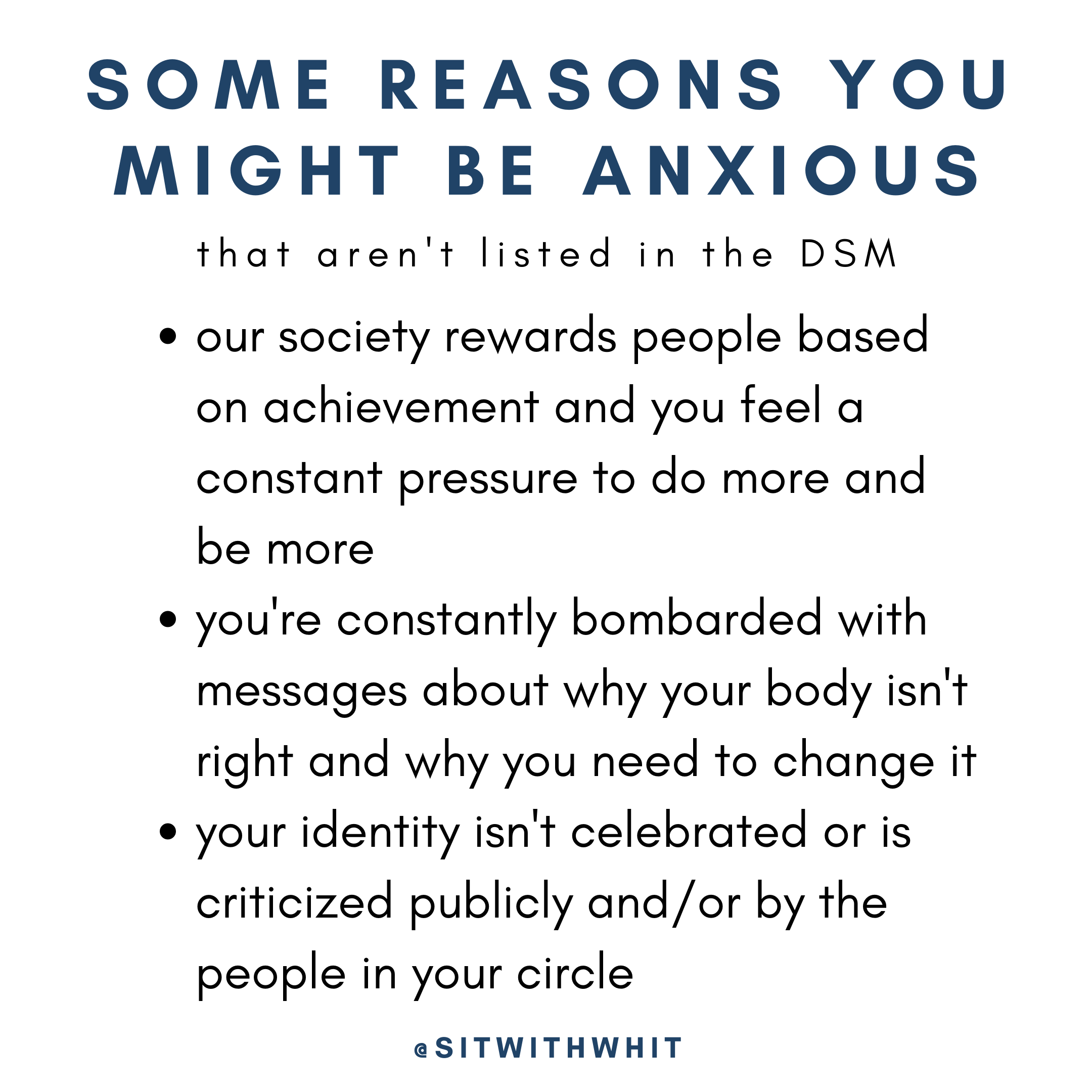What Is Anxiety?: The Signs, Symptoms, Causes, and How To Treat Anxiety
Anxiety is a sensation in the body and a story in the mind. We can think anxious thoughts and physically feel anxious. Most people have felt anxiety at some point in their life.
What Is Anxiety?
Anxiety is a name for a rush of symptoms in the body. It is a physical response that is preparing you to face an intense situation.
An excess of anxiety or constantly being “anxious” can have a massive effect on your physical and mental health.
Anxiety will cause your breathing and hear rate to increase and blood flow will be concentrated on your brain. You may even start to feel hot, nauseous, or lightheaded.
Anxiety can occur in two different ways:
You experience physiological sensations in the body that remind you of moment when you were fearful or afraid. These body sensations are then interpreted and a story is created in the mind. For example, if your heart rate goes up when you step onto an airplane, you may start to think “this airplane is scary. I need to get off of here. I hate flying.”
You may also think negative or anxious thoughts that then lead to sensations in the body, confirming the biases in the mind. For example you start thinking about a speech you have to give and your heart rate goes up, your palms start sweating, and you feel nervous, you may interpret this as “wow I am so scared. I cannot do this. There’s absolutely no way I am prepared.”
If you are feeling physical sensations first, it’s a good idea to try to calm down the body and pause before creating a story with the mind. You can tell yourself, “my body is having a reaction. Let’s see what that is about.” Focus on calming down those sensations. Breathing, tapping, walking, or distraction can all be helpful. Then, you can ask yourself “what is my body trying to tell me right now?” Creating the story when the body is calm will be much more realistic and helpful.
If you are thinking thoughts that are anxiety focused or negative, the body is likely going to react. It feels like this is real and that it needs to protect you. Don’t be surprised when this happens. It is the human body working. You can use the same body oriented skills above or focus on questioning and interrupting the thoughts. I like asking myself “Is this 100% true? Do I absolutely know this is true? And Is there anything that might be incorrect about this thought?”
Anxiety is not something “only in your head.”
It’s also not “just anxiety.”
It is your body feeling like it needs to protect itself. This is something you need to stay alive. Some of us just have way too much of it and in the wrong situations.
Anxiety isn’t just about what’s happening inside of you. It’s also about what is happening around you and to you.
Signs and Symptoms of Anxiety
Someone may experience anxiety if they have Post Traumatic Stress Disorder (PTSD) or have experienced a traumatic event. Obsessive Compulsive Disorder and Anxiety disorders are also characterized by high levels of anxiety and symptoms of anxiety.
Someone with Generalized Anxiety Disorder may experience these symptoms:
Feeling restless, wound-up, or on-edge
Being easily fatigued
Having difficulty concentrating; mind going blank
Being irritable
Having muscle tension
Difficulty controlling feelings of worry
Having sleep problems, such as difficulty falling or staying asleep, restlessness, or unsatisfying sleep
If you notice that you, your child, or someone you care for is struggling with these symptoms, it’s important to have the evaluated by a qualified professional. Anxiety can become more unmanageable the longer it is left untreated. More details below on how to connect with the right therapist, counselor, or psychologist.
Causes of Anxiety
The exact causes and risk factors of anxiety are still unknown, but research does show us that genetic and environmental risk factors play an important role. Other possible risk factors or causes are
Although the risk factors for each type of anxiety disorder can vary, some general risk factors are:
Temperamental traits of shyness or behavioral inhibition in childhood
Exposure to stressful and negative life or environmental events in early childhood or adulthood
A history of anxiety or other mental illnesses in biological relatives
Some physical health conditions, such as thyroid problems or heart arrhythmias, or caffeine or other substances/medications, can produce or aggravate anxiety symptoms; a physical health examination is helpful in the evaluation of a possible anxiety disorder.
How To Get Treatment for Anxiety in Miami, FL or Online
Counseling and therapy have proven to be effective treatments for anxiety. Medication may also be helpful in certain cases. It’s recommended that you meet with a qualified mental health professional - therapist, counselor, psychologist, or psychiatrist - for a full evaluation to diagnose anxiety and rule out any other possible issues.
If you would like to be matched with an anxiety therapist, counselor, psychologist or psychiatrist, we have several options online and in person at The Collaborative Miami. Please complete the form below and we will be in touch ASAP!

